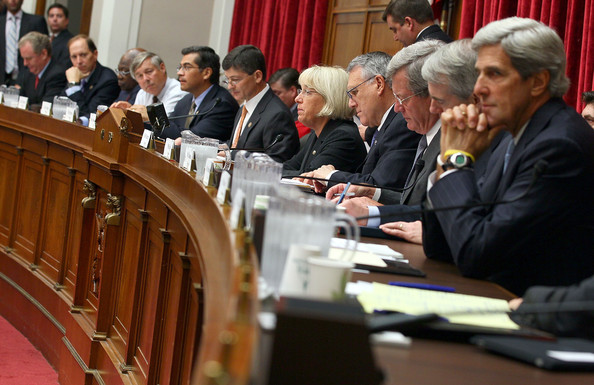Super Committee Braces For Another Fight

The good, the bad and the ugly of politics has been on display for the past few days. None of it popped up spontaneously.
First, the ugly. In an article in The Hill, Alexander Bolton reports that the Joint Select Committee on Deficit Reduction (JSC) “can’t agree on how to count.” This refers to the long-simmering dispute between Democrats and Republicans over what the proper “baseline” from which to count savings really is. Baseline discussions never yield light. Indeed, most outside analysts take all baseline projections of spending and taxes with at least a pound of salt.
How important is this seemingly-arcane matter? Here’s a clue: the first objection lodged by the White House about the baseline to be used by the JSC came from Gene Sperling, within 4 or 5 hours of passage of the Budget Control Act that established the JSC. An hour or so later, House Speaker John Boehner contradicted Sperling, saying that the baseline would be the current law baseline of CBO. Then, in the next morning’s edition of The Financial Times, former OMB Director Peter Orzag weighed in on the baseline question. Anyone with an ounce of sense realized right then that the baseline question, and the actual size of savings proposed by the JSC, would remain a large obstacle to gaining an agreement within the JSC.
So, the JSC simply put the question aside for 6 weeks. Now that ugly baseline fight is flaring up again. Pragmatists might argue that what counts will be the changes in federal programs that the JSC recommends. They would be right. But, since the JSC has a mandate of saving between $1.2-1.5 trillion, the question is, “savings from what”? The Super Committee has the power to “direct scoring” so that its actions meet that mandate, but such an action would begin the erosion of the little remaining fiscal discipline that Congress has.
The outcome of this ugly fight is predictable: the JSC will assert that its actions meet the goals required and tell CBO (in essence) to keep out of the way. CBO will have the final say, next year when it issues its new baseline, but by then Congress will have stumbled into another mess and most voters will neither care nor know about the jiggering of the books.
Second, the bad. The most recent Republican presidential debate was painful. Moderator Charlie Rose seemed stunned at the behavior of some of the participants. Washington Post reporter, Karen Tumulty, an accomplished reporter, seemed astonished at some of the answers to economic questions. None of the 8 candidates ever touched on specific changes to federal programs that he or she would recommend to fundamentally change the debt trajectory of the nation. A couple of vague mentions of the need to save Medicare sufficed to exhaust that subject. Fear of mentioning “stimulus” led to long, meandering and purposely obscure discussions on inchoate jobs-creation plans.
The so-called “establishment candidate,” Mitt Romney and the libertarian Ron Paul both seemed to really know something. Herman Cain’s 9-9-9 economic program was revealed as less than advertised. Rick Perry did himself no favors; Michele Bachmann was articulate; Newt Gingrich was erudite but not often on topic; Huntsman and Santorum tried to get noticed, but failed. Romney may have solidified a lead of sorts in this interminable talk-a-thon, but the weary look on Rose’s face at the end of the debate really summed it all up.
The sad fact remains that not one of the candidates has a specific short-term jobs creation plan, and all are unwilling, except Paul, to make specific recommendations to reform the structure of federal entitlements. Despite the examples of Europe, the courage of Sweden, the recommendations of rating agencies, most of the talk about really tackling the nation’s $15 trillion and rising debt load is just that…talk.
And, the good, that rare bird in our nation’s capital: The three major trade agreements that have lingered for years look poised to pass Congress. Yes, Republicans had to agree to a little more money for the Trade Adjustment Assistance program. But, all in all, the agreements with South Korea, Panama, and Colombia represent a step forward. Globalization is a fact of life and understandings with nations as key as these three, key on a whole host of issues, represent progress.
Objections to the pacts come from the predictable sources. Rep. Dennis Kucinich worries that the agreements may hurt the environment; Rep. Peter DeFazio contends that such treaties will create jobs overseas, not in America (are a lot of Panamanian companies producing competitive products); and union boss Richard Trumka wants an investigation of Colombia’s union wars. As a small trickle of “re-sourcing” jobs to America begins to broaden, those kinds of objections come from sources apparently not up to speed on how competitive American manufacturing is becoming.

